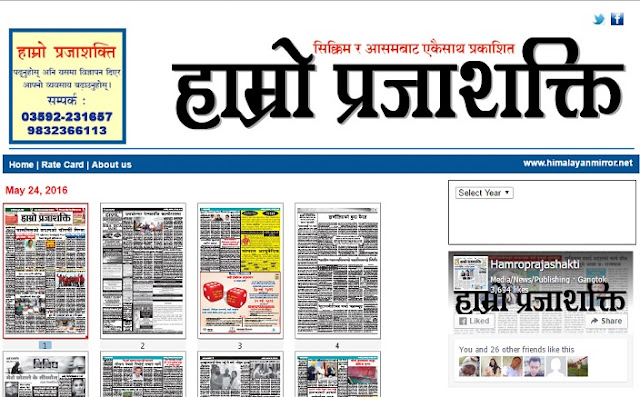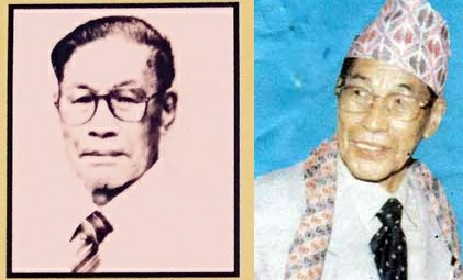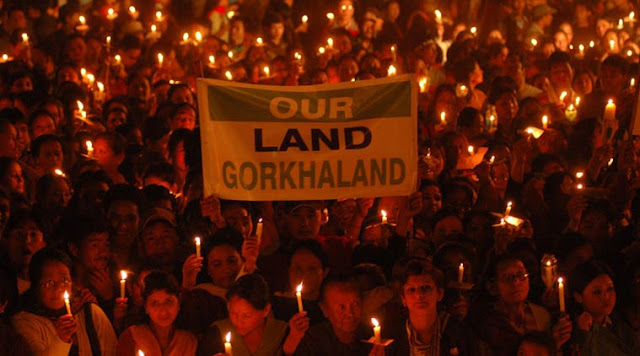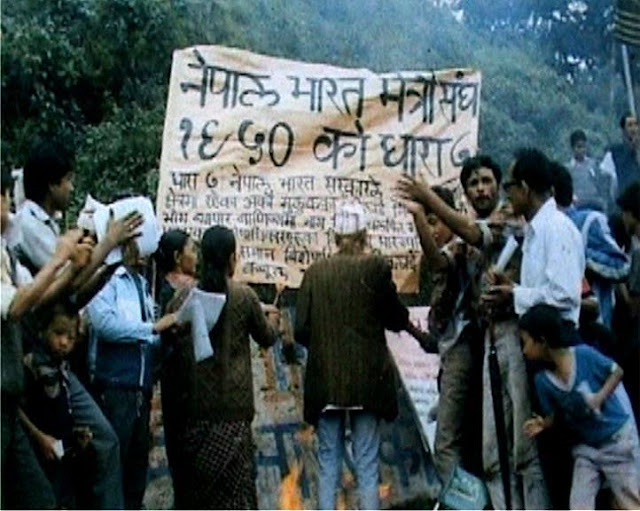Writes Deejay Bolo
It is very unfortunate that Anjaan Upadhya and Pabitra Bhandari have been defaming Sikkim and Sikkimese for the last 2 decades. They run a paper called Hamro Prajasakti.
Hamro Prajasakti (A Daily Nepali Newspaper), yellow paper in the garb of newspaper has been publishing news to malign and defame our Party SDF and the Leader Pawan Chamling for decades. This mouthpiece of frustrated and fallen antisocial and anti Sikkimese elements has misquoted the Chief Minister's speech on Sakewa celebrations on May 21, 2015.
The Chief Minister had asked the gathering to stay away from the propaganda spread by some politically frustrated people gathered as Gorkha Jagaran Sangh against the minorities in Sikkim . His speech was Sikkim-centric.
Shri Chamling while stating the history of Sikkimese Nepali said that we are known as Sikkimese Nepalese down the line in history before the state became part of India in 1975 and thereafter. We are known as Sikkimese Nepalese unlike our brethrens in some other parts of the country.
The SDF Government led by Shri Pawan Chamling has stood by the demand of the Gorkhaland state of Darjeeling hills all along and piloted a resolution in Sikkim Legislative Assembly on 28 March,2011 and Sikkim is the first state to do so. The resolution was adopted unanimously.
Shri Chamling raised Gorkhaland demand in all the national forums including UPA meeting in 2006 , in September 2015 at Gorkha Rangamanch in Darjeeling in full view of the galaxy of national representatives of Gorkha/ Nepali from all over the country . He has been consistently in support of the cause wherever possible.
The Chief Minister also eulogised the history of Gorkhas who have regiments in the Indian Army who have laid down their life for the security of the Country. In the context of Sikkimese Nepalese , it is a fact that they are in majority in the state and therefore bear the responsibility to protect the interest and rights of the minority Bhutia Lepchas .
Sakewa speech of CM dealt with contribution of Gorkhas to the nation and their valour right from the British empire till today. There was nothing against Gorkhas around the country. He never said Gorkhas came to India for recruitment in the army.
Prajasakti paper has hatched a conspiracy to create a difference and controversy to create misunderstanding among Sikkimese Nepalese and Nepalese / Gorkhas around India.
Truth should prevail and words should not be put into our mouth. SDF advises all concerned to condemn this conspiracy of frustrated elements who have conspired with this yellow paper Prajasakti.
Writes Manju Kc Nanu
प्रजाशक्ति पत्रिकाले आज नकारात्मक जातिवाद सोच भएका व्यक्तिहरुको मुखपत्र भएर एसडीएफ सरकार र मुख्य मन्त्रीको बिरोधमा नकारात्मक कुरा जनमानसमा फैलाउने कार्य गरिरहेको छ ।
मुख्यमन्त्रीको सम्भाषणलाई तोड़मोड़ गरेर जातिया अशान्ति फैलाइने षड्यंत्र यो पत्रिकाले गरिरहेको छ । पवन चामलिङको लोकप्रियता दूरदर्शी योजना र कार्यक्रमको डाह लोभ र लालचले जलेर यी नकारात्मक जातीवादी तत्वहरुले बिभिनन प्रोपोगंडा मच्चाए मुख्यमन्त्रीको बदनाम गर्नलागि रहेका छन ।
नकारात्ममक सोचले पत्रकारिता गरेर अशान्ति फैलाएर भाई चारा सद्भावना तोड़ने कोशिश कसैले पनि नगरौ ।
यस्ता नकारात्मक पत्रकारितलाई अब युवा चेली र जनता अघि आएर कड़ा भन्दा कड़ा जवाब दिन अति आवश्यकता देखिन्छ ।
Writes Pravesh Stratosphere Chhetri
भारतमा नेपाली भाषी गोखाॅहरूको पहिचान गोखाॅको रूपमा पहिला भारत को ब्रिटिस सरकारले गोखाॅ रेजिमेन्ट आमीॅ मा बनाएर गोखाॅ हरूलाई छुट्टै पहिचान र सम्मान गरेको हो।अनि गोखाॅ हरू पनि देसको लागि ज्यान प्राण दिएर योगदान गरेको हो।
तर आज गोखाॅ हरू आफ्नो पहिचान र अस्तित्व को लडाई लडन परिरहेको छ, यस्को ज्वालन्त उधारण दाजीॅलीङ जिल्ला लाई छुट्टै राज्य गोखाॅल्याण्ड बनाउने हो।यस्को लागि सिक्किम को मुख्य मन्त्री पवन चामलिङ ज्यू ले सिक्किम बिधान सभामा दाजीॅलिङ लाई छुट्टै गोखाॅल्याण्ड राज्य बनाउनू पछॅ भनेर पास गरेको सबैलाई थाहा छ साथै मुख्य मन्त्रीको रूपमा श्री पवन चामलिङ ले देशका बिभिन्न राष्टिय फोरममा दाजीॅलिङ का गोखाॅल्याण्ड राज्य माँग को समॅथन मा बोल्नू भएको सबै लाई जनकारि भएकै हो।
यसरि सिक्किम छुट्टै राज्यको मुख्य मन्त्री भएर दाजीॅलिङ को गोखाॅ हरू को पक्षमा बोल्दा पश्चिम बंगाल सरकार र केन्द्र सरकार ले चामलिङ ले अकोॅ राज्यमा हस्तक्षार गर्यो भनेर चामलिङ ज्यूलाई Warning दिएको सबैलाई थाहा छ। यसरि चमलिङ ज्यू ले जातीको लागि गोखाॅको पक्षमा अडान लिएको सबैलाई थाहा भएको कुरो हो।
पवन चामलिङ ले अहिले सम्म गरेको काम हरू लाई बिस्वास गनूॅ पछॅ तर उसको बिरोधी हरू ले गरेको षंडयन्त्र र प्रजाशक्ति ले गलत प्रकारले छापेको समाचारलाई बिश्वाश गनूॅ भन्दा पहिला साचो कूरा के हो त्यो बुझ्नू पछॅ यस्तो षंडयन्त्र ले नेपाली अथवा गोखाॅ जाती लाई नै नोकसान गछॅ यो सिक्किमको नेपाली लाई मास्ने षंडयन्त्र हो अनि भारत भरि बसेको गोखाॅ हरू लाई कमजोर गनेॅ षंडयन्त्र हो यस कारण हामी सारा भारत मा बस्ने गोखाॅ हरू मिलेर बस्नू पछॅ षंडयन्त्रमा परेर आफ्नै जाती मा दुश्मनी गनूॅ हुदैन।।
It is very unfortunate that Anjaan Upadhya and Pabitra Bhandari have been defaming Sikkim and Sikkimese for the last 2 decades. They run a paper called Hamro Prajasakti.
Hamro Prajasakti (A Daily Nepali Newspaper), yellow paper in the garb of newspaper has been publishing news to malign and defame our Party SDF and the Leader Pawan Chamling for decades. This mouthpiece of frustrated and fallen antisocial and anti Sikkimese elements has misquoted the Chief Minister's speech on Sakewa celebrations on May 21, 2015.
The Chief Minister had asked the gathering to stay away from the propaganda spread by some politically frustrated people gathered as Gorkha Jagaran Sangh against the minorities in Sikkim . His speech was Sikkim-centric.
Shri Chamling while stating the history of Sikkimese Nepali said that we are known as Sikkimese Nepalese down the line in history before the state became part of India in 1975 and thereafter. We are known as Sikkimese Nepalese unlike our brethrens in some other parts of the country.
 |
| Hamro Prajasakti allegedly defaming Pawan Chamling |
Shri Chamling raised Gorkhaland demand in all the national forums including UPA meeting in 2006 , in September 2015 at Gorkha Rangamanch in Darjeeling in full view of the galaxy of national representatives of Gorkha/ Nepali from all over the country . He has been consistently in support of the cause wherever possible.
The Chief Minister also eulogised the history of Gorkhas who have regiments in the Indian Army who have laid down their life for the security of the Country. In the context of Sikkimese Nepalese , it is a fact that they are in majority in the state and therefore bear the responsibility to protect the interest and rights of the minority Bhutia Lepchas .
Sakewa speech of CM dealt with contribution of Gorkhas to the nation and their valour right from the British empire till today. There was nothing against Gorkhas around the country. He never said Gorkhas came to India for recruitment in the army.
Prajasakti paper has hatched a conspiracy to create a difference and controversy to create misunderstanding among Sikkimese Nepalese and Nepalese / Gorkhas around India.
- Gorkhas have settled in India, they are Indians from time immemorial along with all ethnicity. Chief Minister said that. What is wrong about it??
- Shri Chamling asked the people to be cautious from Gorkha Jagaran Sangh, an anti minority outfit which is misguiding the people . What is wrong about it??
- The CM dwelt on irresponsible and anti Sikkim activities carried out by defeated, frustrated elements who are trying to disturb traditional unity and affinity among Sikkimese BHUTIA LEPCHA NEPALESE AND BYAPARIS. As guardian of the Sikkimese people he does his duty.
- Sikkim has amicable and close relationship and constant touch with the people of Darjeeling. Conspiracy of a yellow paper like Prajasakti should not be taken as truth.
Truth should prevail and words should not be put into our mouth. SDF advises all concerned to condemn this conspiracy of frustrated elements who have conspired with this yellow paper Prajasakti.
Writes Manju Kc Nanu
प्रजाशक्ति पत्रिकाले आज नकारात्मक जातिवाद सोच भएका व्यक्तिहरुको मुखपत्र भएर एसडीएफ सरकार र मुख्य मन्त्रीको बिरोधमा नकारात्मक कुरा जनमानसमा फैलाउने कार्य गरिरहेको छ ।
मुख्यमन्त्रीको सम्भाषणलाई तोड़मोड़ गरेर जातिया अशान्ति फैलाइने षड्यंत्र यो पत्रिकाले गरिरहेको छ । पवन चामलिङको लोकप्रियता दूरदर्शी योजना र कार्यक्रमको डाह लोभ र लालचले जलेर यी नकारात्मक जातीवादी तत्वहरुले बिभिनन प्रोपोगंडा मच्चाए मुख्यमन्त्रीको बदनाम गर्नलागि रहेका छन ।
नकारात्ममक सोचले पत्रकारिता गरेर अशान्ति फैलाएर भाई चारा सद्भावना तोड़ने कोशिश कसैले पनि नगरौ ।
यस्ता नकारात्मक पत्रकारितलाई अब युवा चेली र जनता अघि आएर कड़ा भन्दा कड़ा जवाब दिन अति आवश्यकता देखिन्छ ।
Writes Pravesh Stratosphere Chhetri
भारतमा नेपाली भाषी गोखाॅहरूको पहिचान गोखाॅको रूपमा पहिला भारत को ब्रिटिस सरकारले गोखाॅ रेजिमेन्ट आमीॅ मा बनाएर गोखाॅ हरूलाई छुट्टै पहिचान र सम्मान गरेको हो।अनि गोखाॅ हरू पनि देसको लागि ज्यान प्राण दिएर योगदान गरेको हो।
तर आज गोखाॅ हरू आफ्नो पहिचान र अस्तित्व को लडाई लडन परिरहेको छ, यस्को ज्वालन्त उधारण दाजीॅलीङ जिल्ला लाई छुट्टै राज्य गोखाॅल्याण्ड बनाउने हो।यस्को लागि सिक्किम को मुख्य मन्त्री पवन चामलिङ ज्यू ले सिक्किम बिधान सभामा दाजीॅलिङ लाई छुट्टै गोखाॅल्याण्ड राज्य बनाउनू पछॅ भनेर पास गरेको सबैलाई थाहा छ साथै मुख्य मन्त्रीको रूपमा श्री पवन चामलिङ ले देशका बिभिन्न राष्टिय फोरममा दाजीॅलिङ का गोखाॅल्याण्ड राज्य माँग को समॅथन मा बोल्नू भएको सबै लाई जनकारि भएकै हो।
यसरि सिक्किम छुट्टै राज्यको मुख्य मन्त्री भएर दाजीॅलिङ को गोखाॅ हरू को पक्षमा बोल्दा पश्चिम बंगाल सरकार र केन्द्र सरकार ले चामलिङ ले अकोॅ राज्यमा हस्तक्षार गर्यो भनेर चामलिङ ज्यूलाई Warning दिएको सबैलाई थाहा छ। यसरि चमलिङ ज्यू ले जातीको लागि गोखाॅको पक्षमा अडान लिएको सबैलाई थाहा भएको कुरो हो।
पवन चामलिङ ले अहिले सम्म गरेको काम हरू लाई बिस्वास गनूॅ पछॅ तर उसको बिरोधी हरू ले गरेको षंडयन्त्र र प्रजाशक्ति ले गलत प्रकारले छापेको समाचारलाई बिश्वाश गनूॅ भन्दा पहिला साचो कूरा के हो त्यो बुझ्नू पछॅ यस्तो षंडयन्त्र ले नेपाली अथवा गोखाॅ जाती लाई नै नोकसान गछॅ यो सिक्किमको नेपाली लाई मास्ने षंडयन्त्र हो अनि भारत भरि बसेको गोखाॅ हरू लाई कमजोर गनेॅ षंडयन्त्र हो यस कारण हामी सारा भारत मा बस्ने गोखाॅ हरू मिलेर बस्नू पछॅ षंडयन्त्रमा परेर आफ्नै जाती मा दुश्मनी गनूॅ हुदैन।।














+Avinash+Gurung+at+the+Gorkha+Rangamanch+Bhavan+in+Darjeeling+on+Saturday;+Bimal+and+Asha+Gurung+in+the+audience.+Pictures+by+Suman+Tamang.jpg)


